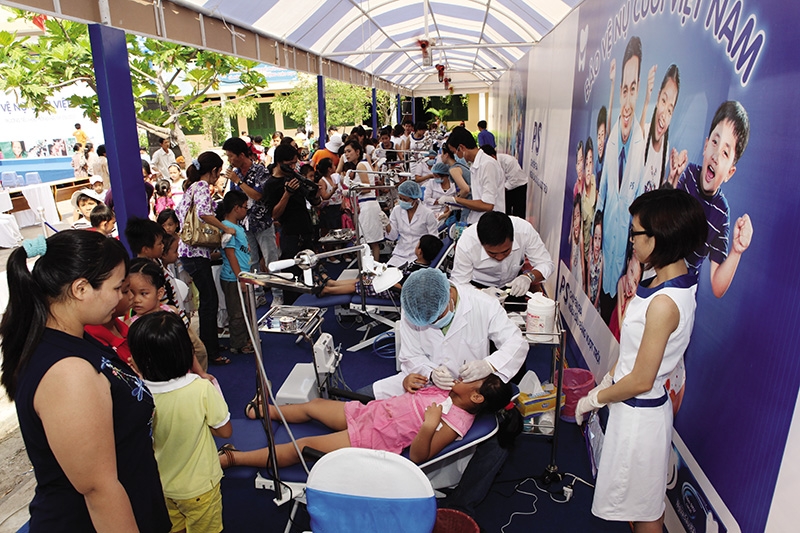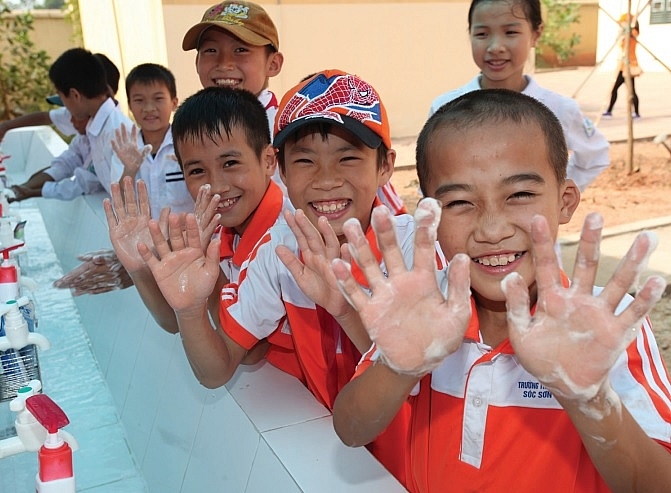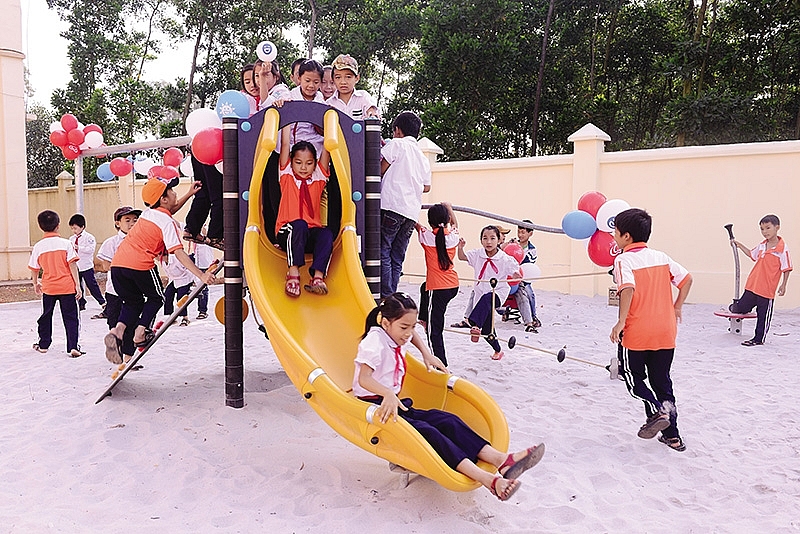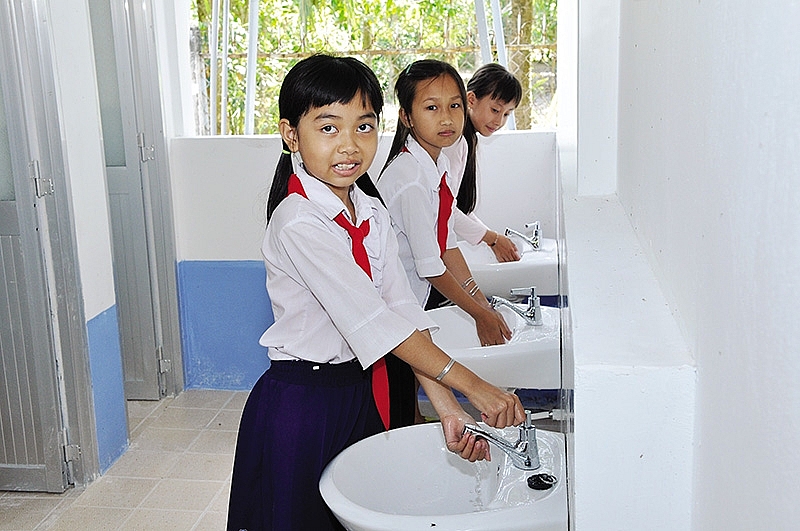Sustainable development journey of Unilever in Vietnam
 |
| Unilever has provided free dental check-ups and treatment for over 6.8 million people nationwide |
A1-
A2
A3
A4
In Vietnam, Unilever has announced the Unilever Sustainable Living Plan lasting from 2010 to 2020 with three big goals:
1. Improving health and well-being for more than 20 million people in Vietnam;
2. Reducing environmental impact by half associated with the making and use of its products; and
3. Enhancing livelihoods for millions of people in Vietnam as Unilever grows its business.
 |
| Children in rural areas are guided to wash their hands with soap at a newly built hand-washing sink |
Improving health and well-being for more than 20 million Vietnamese people
To facilitate the first goal, Unilever has actively implemented the For a Healthier Vietnam programme in collaboration with the Ministry of Health, and the Ministry of Education and Training. Unilever has so far reached more than 21 million people through its initiatives.
The Protecting Vietnamese Smiles programme by P/S has provided education on oral healthcare, free dental check-ups, and treatment for over 6.8 million people nationwide. Meanwhile, Lifebuoy, with an aim of protecting the lives of Vietnamese people by promoting handwashing with soap, has reached 31 million people via its communication and other practical activities through the For a Healthier Vietnam programme.
The Germ-free Toilet Journey by Vim has improved sanitary conditions for 4.7 million people in Vietnam. Specifically, Vim has carried out communication activities to increase awareness of personal and environmental hygiene. It has also provided support to build nearly 40,000 clean toilets in the community as well as build and upgrade nearly 1,000 toilets for primary schools across the country.
With Omo, every stain has a great story, a valuable lesson, and an unforgettable memory behind. Stemming from that belief, Omo has begun the campaign to ensure that one million Vietnamese children can be confident in getting dirty and playing safely. The initiative aims to provide kids with the necessary knowledge and skills so that they can play freely in nature.
 |
| Children playing at the standard playground at a Perfect Village |
Reducing environmental impact by half
To halve its environment footprint, Unilever commits to reducing greenhouse gas emissions and become “carbon positive” in its operations by 2030. Since 2011, the company has been issuing monitoring reports and placing priority on renewable energy. As of present, the firm covers 48 per cent of its energy requirements from biomass boilers heated by rice husks. In 2015, Unilever achieved International Renewable Energy Certificates (I-RECs) for all electricity, which means its electricity consumption is “carbon positive”.
The proliferation of plastic waste is currently another challenge to environmental protection. Unilever’s vision is a world in which everyone works together to ensure that plastic stays in the economy and out of the environment. Therefore, Unilever has announced ambitious new commitments to reduce its plastic waste and help create a circular economy for plastics. Accordingly, Unilever has confirmed that by 2025 it will halve its use of virgin plastic, by reducing its absolute use of plastic packaging by more than 100,000 tonnes and accelerating its use of recycled plastic. It will also help collect and process more plastic packaging than it sells.
 |
| The Germ-free Toilet Journey by VIM provided support to build, repair, and upgrade toilets for schools nationwide |
Enhancing livelihoods of millions of people in Vietnam
Unilever has been actively involved in the National Targeted Programme on the New Rural Development (2010-2020). The company has initiated a public-private partnership programme with the Ministry of Agriculture and Rural Development to implement the Perfect Village model. As of present, the Perfect Village model has been implemented in more than 2,400 communes nationwide. Through the programme, Unilever has helped to fulfil 10 out of 19 new rural criteria in fields including education, healthcare, infrastructure, culture, environment, and communications, in line with the national targeted programme.
Besides, the Empowering Women through Business Development and Health Education programme has helped poor women in all 63 provinces to improve their living standards by giving them better access to employment and training, to be able to establish their own businesses with the Microfinance Loan programme, and to enhance their knowledge about health, hygiene, and nutrition so that they can take good care of their families.
Unilever Vietnam has invested over VND20 billion ($870,000) into the Microfinance Loan programme. Over 46,000 households have accessed loans worth VND320 billion ($13.9 million) in total to develop their household economy and improve access to clean water and sanitation. In addition, the firm has provided trainings on capability building, nutrition, and health education for nearly 1.5 million women nationwide by the end of 2018.
Sustainable purposes – Sustainable brands – Sustainable products
Setting sustainable development as a core in its business model, Unilever has not only achieved success in business, but also enhanced the confidence of consumers and partners in its sustainable values. Nowadays, consumers are paying more attention and interest to social campaigns related to health, hygiene, and nutrition initiated by Unilever brands like Lifebuoy, Vim, P/S, Omo, Knorr, and many more. Thanks to the growing attention of consumers, Unilever has achieved higher revenue growth and created better brand awareness.
The Unilever Sustainable Living Plan marks an important milestone in Unilever’s efforts to constantly improve the lives of people in Vietnam and drive towards a more sustainable future.
What the stars mean:
★ Poor ★ ★ Promising ★★★ Good ★★★★ Very good ★★★★★ Exceptional
Related Contents
Latest News
More News
- The generics industry: unlocking new growth drivers (February 04, 2026 | 17:39)
- Vietnam ready to increase purchases of US goods (February 04, 2026 | 15:55)
- Steel industry faces challenges in 2026 (February 03, 2026 | 17:20)
- State corporations poised to drive 2026 growth (February 03, 2026 | 13:58)
- Why high-tech talent will define Vietnam’s growth (February 02, 2026 | 10:47)
- FMCG resilience amid varying storms (February 02, 2026 | 10:00)
- Customs reforms strengthen business confidence, support trade growth (February 01, 2026 | 08:20)
- Vietnam and US to launch sixth trade negotiation round (January 30, 2026 | 15:19)
- Digital publishing emerges as key growth driver in Vietnam (January 30, 2026 | 10:59)
- EVN signs key contract for Tri An hydropower expansion (January 30, 2026 | 10:57)

 Tag:
Tag:




















 Mobile Version
Mobile Version